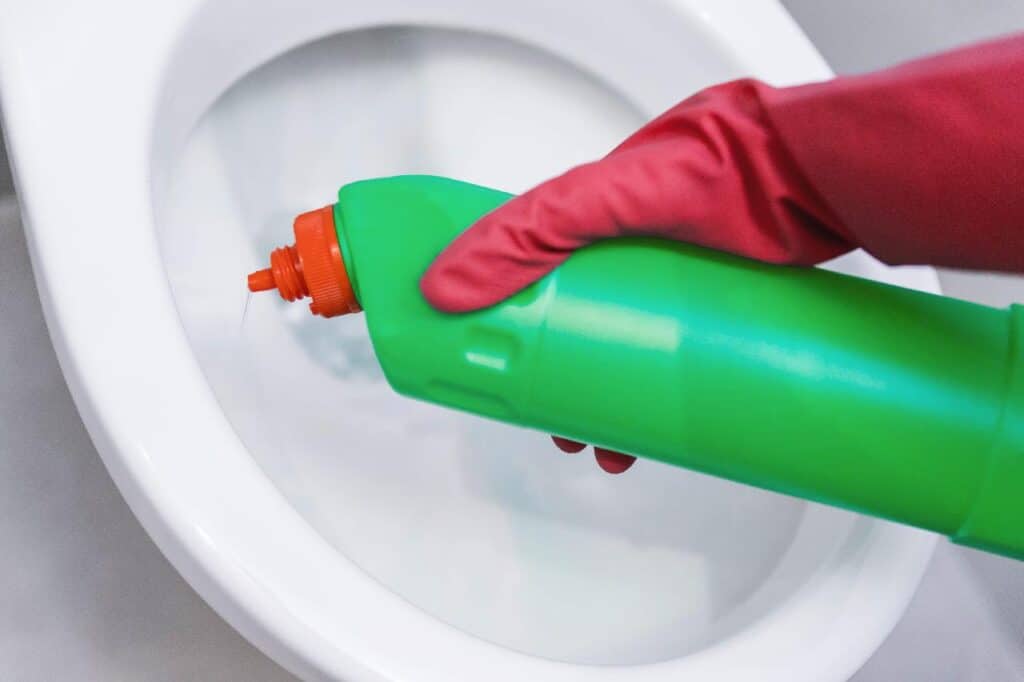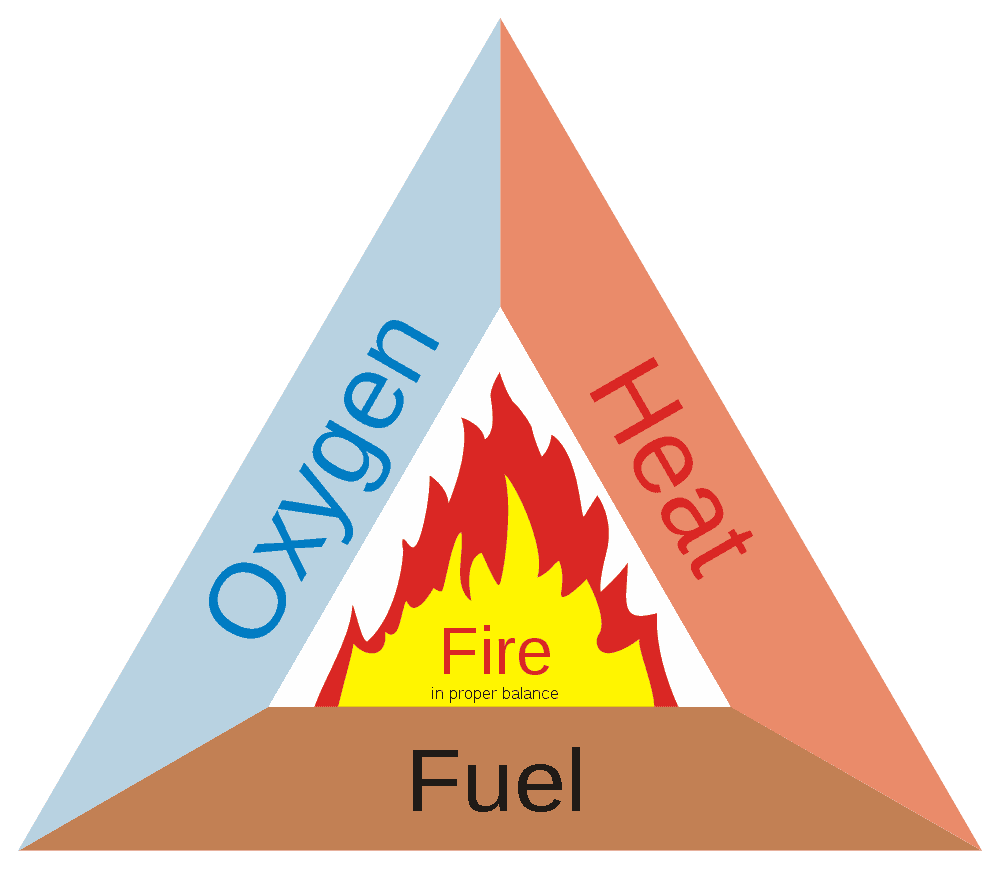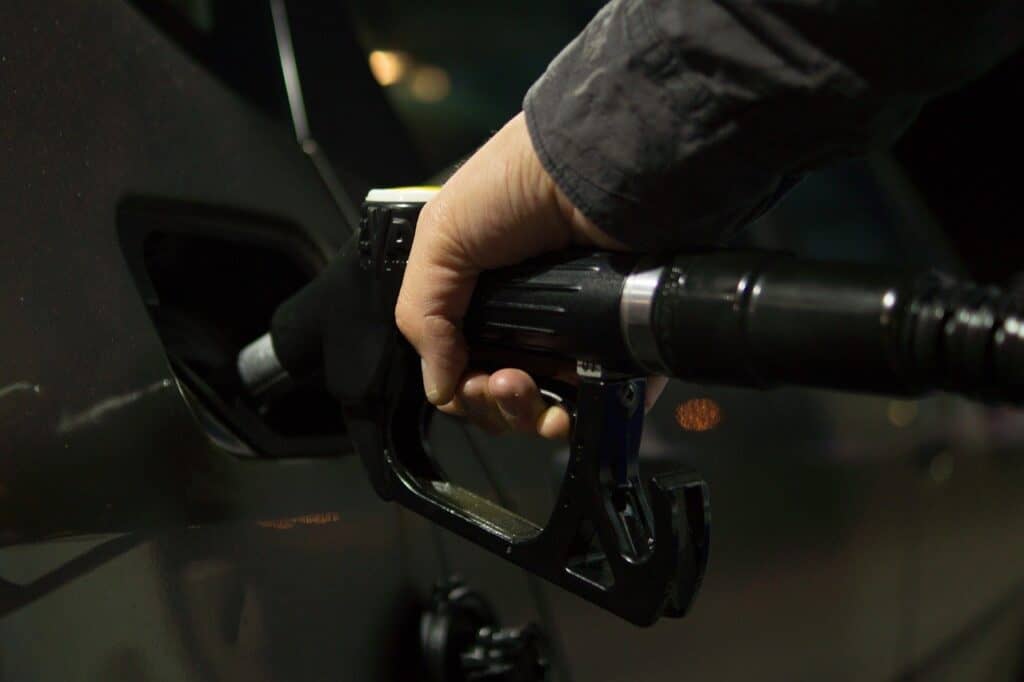Bleach is a common, household chemical that is used for everything from sanitizing bathrooms to whitening fabrics to removing mold or mildew. While it is used all over, many don’t know what bleach is made from and they wonder if it can catch on fire or even explode if heated. So, is Bleach Flammable?
No, Bleach (chlorine and non-chlorine) is a non-flammable liquid. It will not catch fire or burn on its own. However, its oxidizing properties can cause fire to burn at higher temperatures, more intensely, and even cause it to spread faster.
Though bleach might not technically be flammable, this household chemical can still be hazardous and must be used properly. Let’s take a look at bleach and what might happen if it is heated or set on fire.
Your # 1 priority is keeping your family safe. As a firefighter, I recommend everyone has updated smoke detectors that don’t require battery changes, like these ones from Kidde, a fire extinguisher, like this one from Amerex, and a fire escape ladder if you have bedrooms above the first floor, I recommend this one from Hausse.
Also read: What Makes Something Flammable?
What is Bleach?

Everyone has probably used bleach products for some type of surface deep cleaning, as a toilet bowl cleaner, or even to bleach your laundry. It is used every day for a variety of purposes, both in the home and in many industries.
Bleach is basically any product that is used to take a stain or discoloration out of any fabric-type material. You have heard of the process of “bleaching”. Think of adding some bleach to your white load of laundry to keep it white.
There are two main types of bleach:
- Chlorine Bleach
The liquid bleach most people think of is something like Clorox all-purpose bleach. These are considered chlorine-based bleaches. This type of bleach gets its stain removing abilities from a chemical called sodium hypochlorite (NaOCl).
Don’t worry, we won’t get too sciencey in this article.
Sodium hypochlorite is diluted into water to create this chlorine bleach that we all know and use. It is very corrosive with a pH of 11-13.
Chlorine-based bleaches don’t contain any actual chlorine by themselves, however, they can release chlorine gas when used and that is why they get the name. The chlorine that is released is the same chlorine that is used to sanitize public drinking water to give you clean tap water at home.
- Non-Chlorine Bleach
The second type of bleach is non-chlorine-based bleach, which usually contains Hydrogen Peroxide instead. This form of bleach can still whiten fabrics but works differently as a disinfectant.
There are also other types of bleach, but they are less commonly used.
Also read: Is Chlorine Flammable?
What Does Flammable Really Mean?
What does it really mean when they say something is flammable vs. not flammable? Most things will burn or melt if they are heated hot enough for long enough, but that doesn’t mean they are flammable?
In order for a fire to occur, you need 3 basic things: Heat, Oxygen, and Fuel.

When we talk about whether or not a material is flammable, we are referring to the fuel component of the fire. Even if a substance is not technically flammable, that does not mean that it will have no effect on fire.
Something can make a fire burn hotter and more intensely, without actually being flammable if it contributes to the other fire components (heat or oxygen).
Also read: Is Blood Flammable? Will it Catch Fire?
Is Bleach Flammable or Explosive?
Regular household bleach is usually 5-10% sodium hypochlorite diluted with water and used mostly as a cleaning product. This type of bleach is not a flammable liquid and will not catch fire in most instances.
There are also non-chlorine based bleaches. These types of bleaches are also not flammable, however, since hydrogen peroxide is an oxidizer, this type of bleach could potentially make a fire more intense.
Actually, chlorine-based bleaches can also react and give off chemicals that act as oxidizers and therefore can also cause a fire to worsen. In certain circumstances, either of these bleaches could be the oxidizing agent that could potentially explode. This is especially true if bleach is mixed with acetylene or ammonia.
The concentrations of oxidizers found in most bleach is usually too low to have a strong effect in increasing fire intensity. However, stronger mixes, like chlorine powder used in pools can even spontaneously combust!
For this reason, never mix bleach with any other chemicals, flammable materials, or cleaning products, especially ammonia or acidic/corrosive materials (even vinegar). Chlorine can react with Ammonia and create an inhalation hazard and these bleach fumes can interfere with your breathing. Bleach may not be flammable but it can still be a hazardous chemical.
So, bleach won’t catch on fire the way gasoline will, but it can be hazardous in certain instances.
To learn more about the danger of bleach, read this.
Also read: Is Hydrogen Peroxide Flammable? Examined
What Happens When Bleach is Heated?
If you were to heat bleach, it may cause a reaction that could be dangerous.
As we talked about above, the most common type of bleach is made with sodium hypochlorite diluted in water. This chemical can give off chlorine gas when used and this process can be accelerated by heat. The heating of bleach can cause an increase in bleach fumes to be released, which as we talked bout, can be dangerous if inhaled.
Use caution when using bleach products and you probably shouldn’t be heating bleach anyway.
Also read: Is Windex (Glass Cleaner) Flammable?
Conclusion
Bleach is a generic name for a variety of chemicals that are used to remove stains from fabrics. The most common chlorine-based bleach is not flammable, however, it can potentially increase fire intensity or even cause an explosion due to its oxidizing properties.
Related Articles
Is Helium Gas Flammable? Can it Explode?
Is Engine/Motor Oil Flammable? You May Be Surprised

